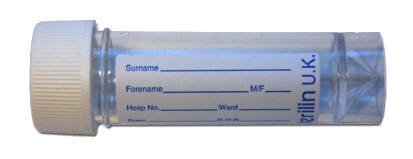Cerebrospinal Fluid (CSF) Protein and Glucose
Chemical Pathology
Notes
CSF protein
- The spinal fluid normally contains very little protein since serum proteins are large molecules that do not cross the blood-brain barrier. Most of the protein that is normally present is albumin.
- CSF protein concentration may rise due to 2 factors: either an increased permeability of the blood brain barrier allowing more protein and higher molecular weight proteins to enter the CSF or proteins may be synthesised within the cerebrospinal canal by inflammatory or other invading cells.
- Mild protein elevation may be caused by viral meningitis, neurosyphilis, subdural haematoma, cerebral thrombosis, brain tumour, multiple sclerosis (rarely >1.00 g/L)
- Moderate or pronounced elevation may be caused by acute bacterial meningitis, tuberculous meningitis, spinal cord tumour, cerebral haemorrhage, Guillain-Barre syndrome.
- When CSF protein levels are low it can indicate rapid CSF production.
- **DO NOT SEND CSF SAMPLES VIA THE AIR TUBE. SAMPLES MUST BE TAKEN BY HAND TO PATHOLOGY RECEPTION**
CSF glucose
- Glucose levels in CSF normally reflect the levels seen in the blood. There may be a 2–4 hour lag in the CSF level when compared to the blood level.
- Whilst not diagnostic, low glucose levels, as compared to plasma levels, are seen in bacterial meningitis, cryptococcal meningitis, malignant involvement of the meninges and sarcoidosis.
- Glucose levels are usually normal in viral infections of the CNS.
Sample requirements
If other investigations required please check CSF Sample Requirements for further details.
- 1mL of CSF is approximately equal to 25 drops from the Luer connector of the needle.
- Results on bloodstained samples will be unreliable.
Protein
- Preferred tap: Tap #2 or #4
- CSF volume: Minimum 0.25 mL (6 drops)
- Sample tube: Plain Universal container (tubes containing gel or anticoagulant are not suitable for analysis of CSF protein).

Glucose
- Preferred tap: Tap #2 or #4
- CSF volume: Minimum 0.25 mL (6 drops)
- Sample tube: 2mLfluoride-oxalate tube (grey top).

Required information
Label ALL bottles with:
- The tap number (1-4)
- Hospital Number
- Surname
- Forename
- Date of Birth
On the request card please indicate:
- Clinical reason for the investigation
- Date of any previous lumbar puncture (if within the last month)
- The date and time of the current lumbar puncture
Turnaround times
The assays are run throughout the day and night. The in-lab turnaround time is less than 24 hours. The test can be ordered as an urgent request.
Results should normally be available within 1 hour of sample receipt for the acute unit, or within 24 hours for samples received from outside the acute units.
Reference ranges
CSF Protein
| Age | Reference range (g/L) |
|---|---|
| Up to 1 day old | 0.40-1.20 |
| 1 day–1 month old | 0.20-0.80 |
| >1 month old | 0.15-0.40 |
CSF Glucose
CSF glucose is normally >70% of the plasma glucose levels.
Further information
To learn more about CSF testing, Lab Tests OnLine
Page last updated 29/04/2024